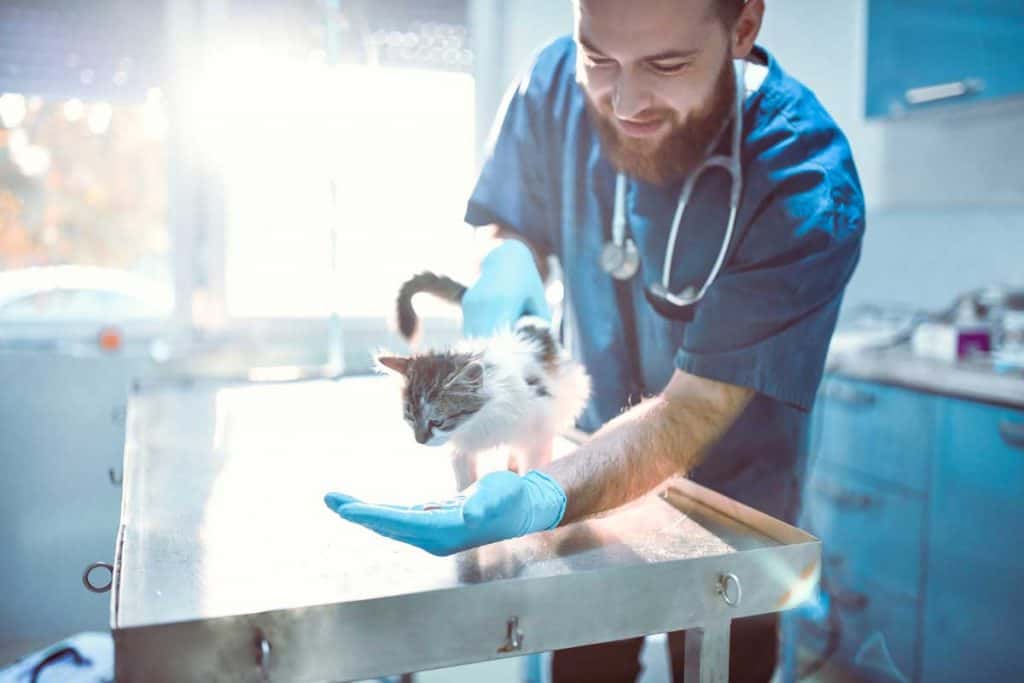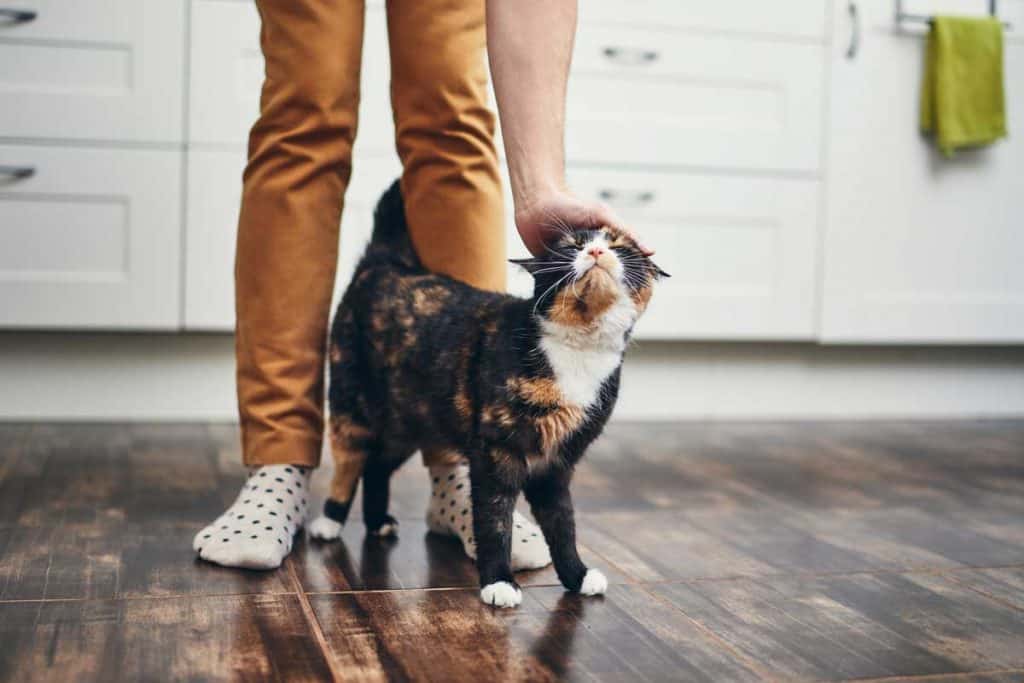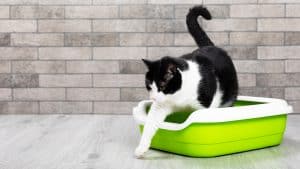 Having an older cat can bring forth a long list of challenges. One of the most frustrating is some senior cats will start doing their business outside the litter box. It's a rather gross and stressful problem to deal with as a cat owner. But we did a great deal of research on the topic and found some ways to help your cat overcome these issues.
Having an older cat can bring forth a long list of challenges. One of the most frustrating is some senior cats will start doing their business outside the litter box. It's a rather gross and stressful problem to deal with as a cat owner. But we did a great deal of research on the topic and found some ways to help your cat overcome these issues.
These nine tips will ensure your cat returns to using their litter box. Following them should make your life as a senior cat owner a little less frustrating:
- Schedule a Vet Visit
- Keep the Litter Box Clean
- Avoid Changing Too Much
- Make the Little Box More Accessible
- Keep the Litter Box Near Their Favorite Spots
- Make Inappropriate Bathroom Areas Less Appealing
- Get an Additional Litter Box
- Provide Them With a Little Sense of Direction
- Spend Some Quality Time With Your Cat
But before we dive deeper into these tips, you must understand why they've started to avoid the litter box. It's a crucial step in helping them overcome this new issue. Let's look into this topic with more detail and discuss some potential causes of their bathroom problems.
Why Do Some Senior Cats Stop Using the Litter Box?
Several factors can make a senior cat avoid using their litter box. In some cases, it'll be a health issue like cancer, diabetes, urinary tract infection, or kidney problems. Each of these conditions can seriously hamper a cat's ability to use the litter box effectively.
It could also be a case of them becoming arthritic in their older age. This issue would make jumping or even stepping into a litter box incredibly painful for your cat. In fact, arthritis can get so bad it causes them to move at such a slow pace that they can't make to the litter box.
Aside from these health issues, some cats just get a little picky in their old age. These senior cats are used to having their litter box pristine and free of old waste. In this situation, a cat refusing to use a litter box might be them throwing a protest about you leaving it dirty.
This pickiness might extend to them sharing a litter box, as well. It doesn't matter whether your senior cat's been sharing the litter box for years; they might just hit a point where using the same litter box as other cats isn't cutting anymore.
On the other hand, the other cats could have a hand in your senior doing their business elsewhere. The other cats could start acting a bit differently toward the aging one. For example, younger cats might start guarding the litter box to prevent access to it. This situation would cause the senior cat to avoid their trusty litter box and go somewhere safer.
Aging cats suffering from hearing or vision loss might have litter box issues, too. These problems come from the new sense of disorientation, which will make finding this bathroom area difficult.
Cats suffering a cognitive decline due to conditions like dementia could be another cause. Dementia would cause memory loss problems, which could make them forget where the box's located.
Lastly, it could have nothing to do with their health or pickiness at all. It could be a simple act of getting your attention from a cat who's starting to feel a little neglected.
How to React When A Cat Doesn't Use Their Litter Box
Remain calm and collected when dealing with a senior cat who's relieving themselves outside the litter box. You must refrain from shouting, spraying them with water, or disciplining them in any way. These tactics don't work with cats and will only make things worse by causing them more stress.
It's important to remember these senior cats are doing their best. In most cases, it's just not possible to use the litter box effectively anymore. You should try and help them while attempting the tips we've laid out in later sections.
For instance, you should cordon off an area for your senior cat when trying those tips. We suggest avoiding areas with soft surfaces like a carpet. Instead, it'd be wise to pick a space that you don't mind getting spoil and padding it with some old comfy blankets.
This space should be near one of the cat's favorite spots. It will ensure they don't feel alienated or neglected. You should also make sure this area has nearby access to a litter box, food, and water. Visiting them in this area often would be another smart move. Some people even get a see-through gate to make sure their cat can still feel like part of household activities.
But remember, changing the litter box's set up in any way could upset a senior cat. You'll need to stick with whatever changes are made. This action will help build up your cat's confidence in the litter box as their preferred bathroom area. But if you change too much, it could have the opposite effect and make matters worse.
Tips For Dealing With Litter Box Issues
Our prior sections should have provided enough background information about this topic. You should now be ready to help them overcome these issues. These following tips will walk you through the entire process:
1. Schedule a Vet Visit

After noticing a change in your cat's litter box behavior, the first move should always be scheduling a vet visit. You should provide a detailed account of what's changed and have them run several tests. These exams will detail whether your cat has a physical problem causing these issues.
Your vet will then offer treatment for those cats suffering from physical issues or rule them out altogether. Even after the exams take place and medicines are provided, cat owners still might find messes outside the litter box.
If this happens, the rest of our tips should provide a little defense against these issues continuing. These actions will offer a senior cat a little help to feel comfortable using their litter box, again. It's all about ensuring you're aware of their issues and safely accounting for them.
2. Keep the Litter Box Clean
Keeping a clean litter box is a crucial way to combat these issues. Like we mentioned previously, some senior cats will avoid using any litter box that isn't completely spotless. Remaining extra vigilant and increasing your scooping frequency can go a long way.
Buying a higher quality litter could help this situation. We'd recommend picking one that's capable of less debris. Another option to consider would be purchasing a self-cleaning litter box. These devices will automatically clean themselves after every use. But if you do buy a new litter, make sure to transition slowly.
In any case, the goal here is to rule out a dirty litter being your issue. These methods should get the job done and make sure picky senior cats start relieving themselves in the proper place.
3. Avoid making changes
The smallest change inside a litter box can upset any cat. Felines happen to be very sensitive to the conditions in their litter box. After all, it's where a cat feels most vulnerable. It makes a lot of sense that a slight change could set them off the rails.
These changes could include new placement, the addition of ramps/stairs, other cats using it, or a new litter type. As a result, we suggest leaving your old litter box and add things to it gradually. Make sure to have your cat there whenever making a change. It should help assure them that everything's fine.
4. Make the Little Box More Accessible
Senior cats with joint pain or arthritis issues will need a litter box with a low entrance. This type of litter box should accommodate their physical limitations better than other options. Another solution would be adding a ramp to make getting into the box an easier task.
But refrain from switching out the old litter box for a new one. You should instead leave the older one in place and position your new one right next to it. Proceed to add a scoop of litter from the cat's old litter box into the new one. This will make it have a familiar scent and ensure your cat is comfortable using it.
Once your cat has gotten used to the new box, you can remove the older litter box. Make sure to give it a couple of days rather than removing it the first time your cat uses the new one. If you don't, those messes you're trying to avoid might come back with a vengeance.
5. Keep the Litter Box Near Their Favorite Spots
Cat owners tend to hide their litter boxes away in the basement or within an upstairs room nobody uses. Honestly, it makes a lot of sense because these bathroom areas are rather gross. But these placements are a nightmare for aging cats who are losing their mobility.
You must adjust to their new reality and place the box in an area where they spend most of their time. This location should be somewhere quiet, private, and within an open space. Ideally, it'd be somewhere around the area where they spend most of their time.
6. Make Inappropriate Bathroom Areas Less Appealing
Do whatever's possible to make any likely secondary bathroom areas unappealing. You could try putting motion-activated lights in dark places around your house. These spaces tend to be a favorite for cats with bathroom issues.
Some owners have found it helpful to make surfaces less comfortable for their cats. For instance, placing the sticky double-sided tape, upside-down carpet runners, or tin foil on areas where prior bathroom accidents occurred.
Cleaning up these messes using an enzymatic cleaner will also make it less likely a reoccurrence happens. Like most animals, cats like going to the bathroom in familiar areas—places littered with their scent, which makes them feel at home.
Enzymatic cleaners will remove this scent entirely and make the cat find a new bathroom spot. Hopefully, their next choice will be in the litter box instead of somewhere else in your home.
7. Get an Additional Litter Box
You should have one litter box for every cat within your home. We don't suggest getting one for every room or usable area in your home. This would be madness and fairly unsanitary. But making sure your senior cat has its own is a vital step in conquering bathroom issues.
Due to the additional litter boxes, each cat will now have their own clean and desirable place to do his/her business. This idea will also reduce any bullying happening by younger cats inside your home. It's an effective way to ensure your aging cat never feels unsafe about going to the bathroom.
8. Provide Them With a Little Sense of Direction
If your cat has vision issues, hearing loss, or memory problems, it would be ideal to leave your litter box where it has always been. It'll bring some familiarity into their lives, which have now become about disorientation and discomfort.
Cats are remarkable creatures that are capable of navigating to their favorite areas even when riddled with these issues. But you should still assist them by leaving some items with their scent inside or near the litter box. These items will then allow their heightened sense of smell to guide them.
Owners who have cats with severe issues might need to escort their cat toward the litter box. This activity should be done shortly after meals and at regular intervals during the day. It'll lessen the number of bathroom accidents by a large margin.
9. Spend Some Quality Time With Your Cat

The last tip is a simple and fun one. Put some of your day aside to spend a little quality time with your favorite feline. These bathroom issues shouldn't put a damper on your relationship with them. After all, many of these problems are caused by conditions they can't help.
Find a way to remind them nothing has changed about your relationship. It's important to emphasize that you love them and won't trade their companionship for anything. Maybe find some time to take a nap and get a good cuddle session with them (but only if this is something your cat likes).
We hope this article answered all your questions about senior cats with litter box issues. But if you have any follow-up concerns, please let us know in the comments. We'll make sure to answer them as quickly as possible. Thanks for reading!



